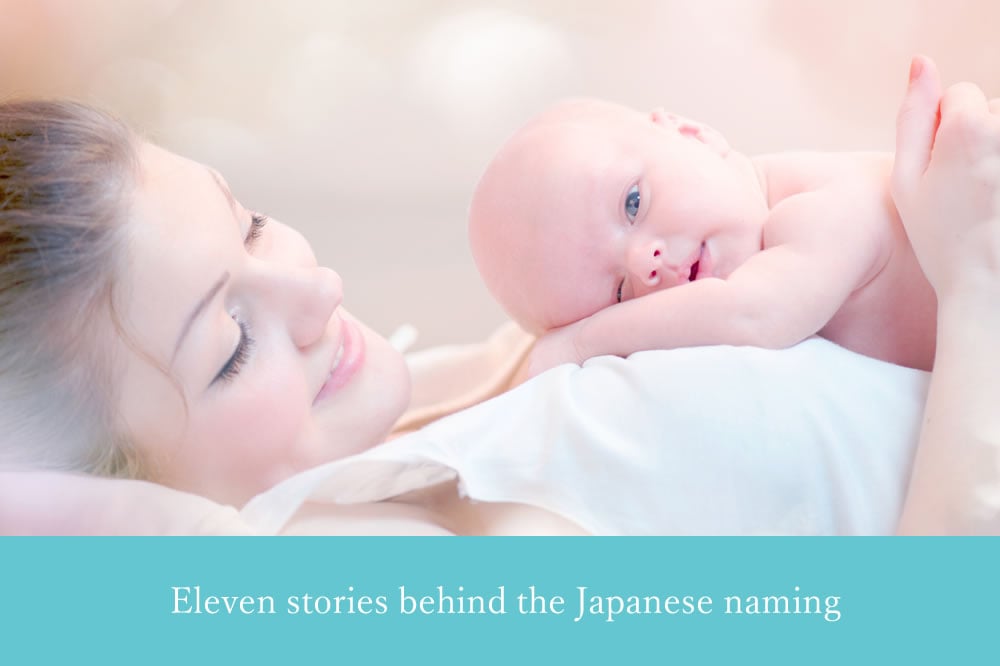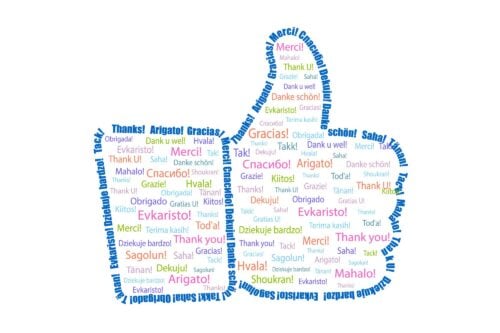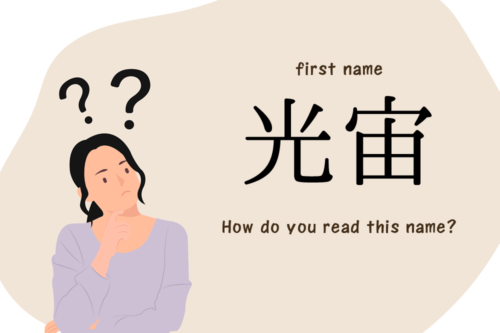Share this link via
Or copy link
Below are navigation links that will take you to the main text and navigation menus.
26,551 first names, 70,620 last names, 333,585 kanji variations.
one of the best Japanese name search tools for your baby!

There are as many names as there are children born, and each naming has its own story. This article will introduce 11 examples of Japanese naming practices.
Contents

sunflower field over cloudy blue sky
When our second baby girl was born, we named her “葵 (Aoi)”. Because our first boy is “向日 (Hyūga)”, and when it combines it becomes “向日葵” – meaning is Sunflower. I hope that they will both grow up to be as big as sunflowers and that they will make the people around them feel happy and cheerful.
向日 (Hyūga) ![]()
meaning: the growth of plants in the direction of strong light
葵 (Aoi) ![]()
meaning: the name of a plant

We have three boys. We wanted to give them names related to nature, so we named our first son “大地 (Daichi)”, our second son “太陽 (Taiyo)”, and our third son “大樹 (Taiki)”. We named them with the image of magnificent nature and the hope that they will be strong and powerful.
大地 (Daichi) ![]()
meaning: land
太陽 (Taiyo) ![]()
meaning: the sun
大樹 (Taiki) ![]()
meaning: big tree

We named our two daughters nature-related names, “双葉 (Futaba)”, “紅葉 (Momiji)” with hoping to grow up to be a healthy and happy person. We used the kanji “葉”- meaning is a leaf – for both of them because we wanted the image to bring a hopeful future.
双葉 (Futaba) ![]()
meaning: the first two leaves to come out when they germinate
紅葉 (Momiji) ![]()
meaning: autumn red leaf

My husband and I met at the university climbing club. We were very attracted to mountain climbing. After we got married, we named our two sons “大登 (Hiroto)” and “岳士 (Gakuto)”. We hope that they will be as magnificent and honorable people like a mountain.
大登 (Hiroto) ![]()
meaning: 大 (big), 登(climbing)
岳士 (Gakuto) ![]()
meaning: 岳 (mountaineering), 士 (samurai)
I always wanted to name children something with kanji for fruit with the hope that they will grow up to be adorable and loved by everyone. And my two daughters were born as twins, so we named them “苺子 (Maiko)” “桃子 (Momoko)”.
苺子 (Maiko) ![]()
meaning: 苺 (strawberry), 子(child)

桃子 (Momoko) ![]()
meaning: 桃 (peach), 子(child)


My husband and I love the major league baseball player Ichiro. We felt that he was a great person, the way he never gave up, and the way he kept working hard on himself. So when our daughter was born, we decided on “一香 (Ichika)” to pick the pronunciation of “Ichi” from Ichiro.
一香 (Ichika) ![]()
meaning: 一 (number one, the first), 香 (fragrance)

LONDON, UNITED KINGDOM – MAY 13 2018: Queen’s Theatre in Shaftesbury Ave. on the corner of Wardour St. opened on 8 October 1907 as a twin to the neighbouring Hicks Theatre (now Gielgud Theatre)
I saw the movie Les Miserables with my wife, and I was so impressed with the movie that I had a lot of respect for the author. That person is Victor Hugo. I named my son ”優護 (Yūgo)” from his sir name Hugo with the hope that he will be able to create a legacy in future generations like Victor Hugo.
優護 (Yūgo) ![]()
meaning: 優 (kind), 護 (protect)

Thomas Edison (1847-1931) on antique print from 1899. American inventor and businessman. After A.Anderson and published in the 19th century in portraits, Germany, 1899.
We named our sun ”閃 (Sen)” from Thomas Edison’s quote as “Genius is 1 percent inspiration and 99 percent perspiration”. We are hoping our son to be a person who has an inspiration to overcome his difficulty by himself.
閃 (Sen) ![]()
meaning: inspiration

We love music. And we have discussed when we got a baby girl, we name her “花音 (Kanon)” to hope that she will always be loved by everyone like the song of “Pachelbel’s Canon”.
花音 (Kanon) ![]()
meaning: 花 (flower), 音(sound, melody)

We went through four years of fertility treatment. My husband and I were almost giving up but we finally had him and we named him “叶多 (Kanata)”. When he grows up, we will tell him that your name “叶多 (Kanata)” has a story that you made all of the family’s wishes come true and made us happy by being born.
叶多 (Kanata) ![]()
meaning: 叶 (dreams come true), 多 (a lot, many)

restored Kumamoto castle
In 2016, there was the foreshock and the main earthquake (magnitude 7) in Kumamoto. I gave birth in the hospital while the aftershocks continued. I was very touched by the birth and my mother said, “Thank you for giving birth at such a difficult time, that baby is everyone’s hope.” My husband and I had almost decided on a different name, but we changed our mind to name our baby girl “希望 (Hikari)” after the unexpected earthquake.
希望 (Hikari) ![]()
meaning: hope
Naming your baby is the first gift from mother and father. Everyone has a story to tell about what kind of thoughts led them to give that name. Your baby will love the name, even more, when they grow up and hear the parents’ stories about their names.




Sort by Most Kanji Variations
This is the order of names with many variations of kanji.
Basically, names with more variations are more common and familiar to the Japanese.
Sort by Most Viewed
The names are sorted by the number of times they have been viewed on this site. This ranking is based on the behavior of users around the world, including Japan, so it does not mean that the names are commonly viewed by Japanese people only.
Please note that just because a name has been viewed more times does not mean it is a famous name in Japan.
What is Hiragana?
Hiragana is a syllabary used in written Japanese, which originated from the cursive style of Kanji.
What is Katakana?
Katakana is also a Japanese syllabary. Basically, the characters don't have any meaning by themselves, they only represent the sounds.
Japanese try to express the words came from foreign languages with the most similar sounds in Japanese using Katakana.
What is English Transcription?
English Transcription is a term used when translating Japanese names into English. It represents a romanised version of the name with the aim of reproducing the pronunciation as accurately as possible. English Transcription can also be used for name searches.
Japanese Style Nickname
In Japan, nicknames are commonly used to express familiarity and affection. Here are key features and contexts:
Shortened Forms: Names are often shortened for ease and intimacy, such as 'Yuki' from 'Yukiko' or 'Taka' from 'Takashi'.
Suffixes: Terms like 'chan' for girls and 'kun' for boys are added to names among close friends and family. However, 'chan' can also be used for boys during childhood. Additionally, among adults who are very close, like best friends, 'chan' may still be used to convey affection and familiarity. More Details
Usage and Cultural Aspects: Nicknames are typically used in informal settings among friends, family, or close colleagues, and are not suitable for formal or professional environments. The use of a nickname suggests a degree of intimacy and should reflect the nature of the relationship. Young people often demonstrate creativity in their social interactions by crafting unique nicknames.
Note: In Japanese, the long vowel sound is indicated by a special character called a "chōonpu" (長音符), which looks like a horizontal dash (ー). This character serves to extend the duration of the vowel sound immediately preceding it. For instance, in the name "あーちゃん" (A-chan), the "あ" (A) is extended, producing a prolonged "ah" sound, similar to the "a" in "father."
Households?
The names are sorted by the number of Japanese households where the surname is used.
The more households there are, the more famous and common the surname is.
About this site's data of last names
